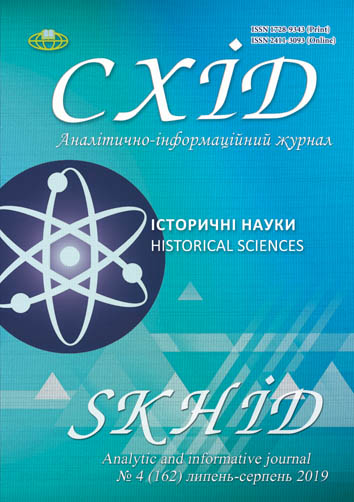Transformation of Ukrainian Name-giving Process: Historical Analysis
DOI:
https://doi.org/10.21847/1728-9343.2019.4(162).177234Keywords:
a name, a proper name, philosophy of a name, Christian tradition of a name, spirituality, spiritual tradition, anthroponymic, ethnical cultureAbstract
The issue is devoted to a value sphere of Christian dominant consideration in the spiritual and semantic space of a name-giving culture in Ukrainian anthroponymic tradition as well as to the historical and philosophical analysis of spiritual peculiarities presented in the process of proper nouns’ creation and functioning in Ukrainian spiritual culture at the pagan times. The urgency of an issue has been intensified by a fact that a name is one of the most crucial symbols in human’s awareness of personal solitude. Anthroponyms (human proper nouns) have been a widely used national lexical phenomenon for different times and epochs, and for different people, that emphasized a constant existential need of the issue in the individual as well as in the social consideration. The sphere of a scientific study is the genesis and peculiarities of Ukrainian onomasticon. The ancient names’ popularity and the general understanding of the true name’s spiritual roots of an ancient name are discussed. The crucial concept of the work is a statement about the preservation of the spiritual sources of a pagan tradition. National Ukrainian onomasticon has been predominantly formed on the Orthodox value basis that is owing to the historical peculiarities of the national, religious and cultural space. The value of a name as a philosophic, cultural, spiritual and historical phenomenon is highlighted. The aim of an issue is to represent a transcendental peculiarity of the proper names and via a structured analysis with the hermeneutic methodology application to highlight the appearance and spiritual components in the elite-sacral, elite-secular and national names in Ukrainian ancient ethical tradition. The cardinal meaningful lines of the names’ spiritual roots are to be analyzed. The conclusions of the issue are embodied in the following statements and constants:
- A name is the most essential expression of self on an ontological level.
- A name is an opportunity of social memory saving on a social level.
- The two level context of Ukrainian onomasticon is represented by a pagan tradition of name-giving which is based on the spiritual unity between a human and natural environment that transforms it into a spiritual charm.
Christian tradition of name blessing considers a name as a spiritual protection of a saint as well as a motivation for further spiritual changes.Downloads
References
Bulgakov, S. (1989). Pravoslaviye: ocherki ucheniya pravoslavnoy tserkvi. Paris: YMCA-PRESS, 409 p. (In Russian)
Bulgakov, S. (1953). Filosofiya imeni. Paris: YMCA-PRESS, 279 p. (In Russian)
Chrysostom, John (2001). Conversations on the Book of Genesis. 21st Conversation. Retrieved from https://azbyka.ru/otechnik/Ioann_Zlatoust/tolk_01/21
Chuchka, P. (2011). Slovyanski osobovi imena ukrayintsiv: istoryko-etymolohichnyy slovnyk. Uzhhorod: Lira, 428 p. (In Ukrainian)
Khrypko, S., Iatsenko, G. (2019). Philosophy of a Name: Ukrainian Context. BEYTULHIKME: An International Journal of Philosophy. 9 (2): 437-451 DOI: https://doi.org/10.18491/beytulhikme.1477 (In English).
Florensky, P. (2000). Imena. Metafizika imen v istoricheskom osveshchenii In: Soch. V 4-kh t.T.3 (2). Moscow: Mysl, 623 p. (In Russian)
Franko, I. (1982). Prychyny do ukrayinskoyi onomastyky. In: Ivan Franko. Zibr. tv.: V 50 t. Kyiv, Vol. 36: 391-427. (In Ukrainian)
Gerasimchuk, V., Nechiporenko, A. (2002). Antroponimy: istoriya i suchasnist. Kamyanets-Podilskyy, 152 p. (In Ukrainian)
Khudash, M. (1977). Z istoriyi ukrayinskoyi antroponimiyi. Kyiv: Naukova dumka, 235 p. (In Ukrainian)
Losev, A. (1990). Filosofiya Imeni. Moscow: MGU Publishing. (In Russian)
Lozko, G. (1998). Imenoslov: imena slovyanski, istorychni ta mifolohichni. Kyiv: Svaroh, 176 p. (In Ukrainian)
Lozko, G. (2011). Ridni imena. Slovyanskyy imenoslov. Ternopil: Mandrivets, 368 p. (In Ukrainian)
Plato (1994). Kratil [Kratylos]. In: Sobr. soch.: V 4 t. Moscow: Mysl, Vol.1. Retrieved from http://www.odinblago.ru/platon_5/4. (In Russian)
Savitska, S., Savitski, O. (2012). Imenoslov: Slovyanski imena ta nazvy. Ternopil, 400 p. (In Ukrainian)
Saint Augustine (2006). Khristianskaya nauka ili Osnovaniya Svyashchennoy Germenevtiki i Tserkovnogo krasnorechiya. St.Petersburg: Bibliopolis, 510 p. (In Russian)
Shibutani, T. (2007). YA-kontseptsiya. In: Psikhologiya samosoznaniya. Samara: BAKHRAKH-M, 245-270 (In Russian)
Skripnik, L., Dziatkivska, N. (1996). Vlasni imena lyudey. Kyiv: Naukova dumka, 336 p. (In Ukrainian)
Suchomlin, I. (1970). Ukrayinski prizvyska lyudey yak vlasni rodovi nazvy. Hovory i onomastyka Naddnipryanshchyny. Dnipropetrovsk: 30-58. (In Ukrainian)
Bibliya (The Bible) (2004). Knyhy Svyashchennoho pysannya Staroho ta novoho Zavitu. Kyiv: Vydannya Kyyivskoyi Patriarkhiyi UPTS KP, 1407 p. (In Ukrainian)
Khristianstvo (1995). Entsiklopedicheskiy slovar: (In 3 Vol.). Moscow: Bolshaya Rossiyskaya entsiklopediya, 863 p. (In Russian)
Slova prepodobnogo Simeona Novogo Bogoslova. (1890). Issue 2. Slovo 68. Moscow, Pp. 190. (In Russian)
Zajvoronok, V. (2006). Znaky ukrayinskoyi etnokultury: Slovnyk-dovidnyk. Kyiv: Dovira, 703 p. (In Ukrainian)
Zajvoronok, V. (2007). Ukrayinska etnolinhvistyka: Narysy. Kyiv: Dovira, 262 p. (In Ukrainian)
Downloads
Published
How to Cite
Issue
Section
License
Copyright (c) 2019 Irina Lomachinska, Svitlana Khrypko, Ganna Iatsenko

This work is licensed under a Creative Commons Attribution-NonCommercial-NoDerivatives 4.0 International License.
1. Authors bear responsibility for the accuracy of facts, quotations, numbers and names used.
2. Manuscripts are not sent back.
3. The publisher does not always agree with the authors' opinion.
4. The authors reserve the right to authorship of the work and pass the first publication right of this work to the journal under the terms of a Creative Commons Attribution-NonCommercial-NoDerivatives 4.0 International License. This license allows others to distribute (copy) the published work for non-commercial purposes, provided there is mandatory attribution to its authors and a link to the first publication in our journal.
5. The authors have the right to conclude separate supplement agreements that relate to non-exclusive work distribution in the form in which it has been published by the journal (for example, to upload the work to the online storage of the journal or publish it as part of a monograph), provided that the reference to the first publication of the work in this journal is included.

